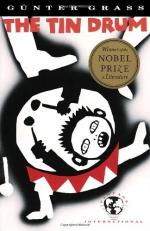|
|
The Tin Drum Chapter 8: The Stockturm. Long-Distance Song Effects
In the institution, Oskar mentions Dr. Hornstetter, a nervous woman who comes into his room to smoke cigarettes and re-diagnose the fact that Oskar suffers from childhood isolation. Oskar says she is right - he hardly ever played with other children when he was young, preferring his Rasputin and Goethe medley to childish games.
There was a courtyard behind Oskar's building, a place where the housewives took all of their rugs to beat the dirt out of them, a ritual that Oskar hated. The courtyard was where the children in Oskar's building played. There was a shed in the courtyard that belonged to Old Man Heilandt. The shed was full of rusted machinery, and he would let Oskar in but none of the other children. The old man spent his time straightening old nails that he pulled out of wooden crates.
One day the children in the apartment building, Nuchi Eyke, Axel Mischke, Harry Schlager, Hänschen Kollin, and Susi Kater were playing by making a soup out of whatever they could find around the building. They asked Old Man Heilandt to spit into the pot three times, added pulverized brick, then two live frogs. Then all the children, including Susi Kater, the only girl, took turns peeing into the pot. Oskar ran away from the children; it was the wrong thing to do. He went to the attic and tried to drum, but the children followed him, carrying the soup, and formed a ring around him. Axel pinned Oskar down while Susi took a spoon and forced some of the soup into Oskar's mouth. The children left, and Oskar went to a corner and threw up the soup. He looked out over the town and sang with his glass-breaking voice - nothing broke, but Oskar was convinced of the possibility of long-distance singing and resolved to leave his home and escape soup-makers and tiny courts.
Oskar's mother took Oskar shopping every Thursday, and every two weeks she took him to Sigismund Markus' toy store to buy a new drum. From ages seven to ten Oskar went through a drum in two weeks. From ten to fourteen it was down to less than a week. Later, the timing became unpredictable: the time it took Oskar to demolish a drum based itself on Oskar's mental stability at the time.
Markus was in love with Agnes Matzerath, but he never acted on his impulses; rather he paid her complements and sold her silk stockings and Oskar's drums at incredible prices. Agnes would then ask if she could leave Oskar with Markus for a few hours to run some errands. All three of them, Oskar included, knew that she was in fact going to meet Jan Bronski in a hotel room, then go out with him for coffee. Oskar knew because he had accompanied his mother on several occasions, waiting for her in the hotel lobby.
One Thursday when Markus was not being too attentive to Oskar, Oskar took his drum and left the store, making his way to the Stockturm, a tower in Danzig about 150 feet tall. He had to wedge his drumsticks in between the iron door and the brick and use them as a lever to open the door. He climbed the spiraling staircase, lamenting the fact that there were pigeons everywhere on the tower. Pigeons he says, or doves, are used as a sign of peace when they should not be; even hawks and vultures are less quarrelsome. At the top, Oskar looked out at the coffee mill shape of the Stadt-Theater, then began trying to sing out its windows. It was the first time Oskar used his voice for its own sake, when he was not threatened. He became, just as a great painter, an artist with a specific style. He tried several different pitches, then in the end succeeded with an almost noiseless scream. He then spotted Agnes and Jan returning from the café, and he rushed back to the toy store.
When he arrived, he saw Markus kneeling in front of Agnes. He was begging her not to continue her liaisons with Jan, for he was with the Poles, who were sure to lose to the oncoming Germans. He begged her and Oskar to go with him to London. Agnes refused, saying she could not, on account of Jan. Markus backed down and agreed, although he warned Agnes to choose Matzerath and the Germans over Jan and the Poles. Oskar says that now, when he revisits the Stockturm and the Stadt-Theater, he searches for Poland, with every organ of his being, but not his soul, for that is not an organ. He says:
"I look for the land of the Poles that is lost to the Germans, for the moment at least. Nowadays the Germans have started searching for Poland with credits, Leicas, and compasses, with radar, divining rods, delegations, and moth-eaten provincial students' associations in costume. Some carry Chopin in their hearts, others thoughts of revenge. Condemning the first four partitions of Poland, they are busily planning a fifth; in the meantime flying to Warsaw via Air France in order to deposit, with appropriate remorse, a wreath on the spot that was once the ghetto. One of these days they will go searching for Poland with rockets. I, meanwhile, conjure up Poland on my drum. And this is what I drum: Poland's lost, but not forever, all's lost, but not forever, Poland's not lost forever." Chapter 8, pg. 108




